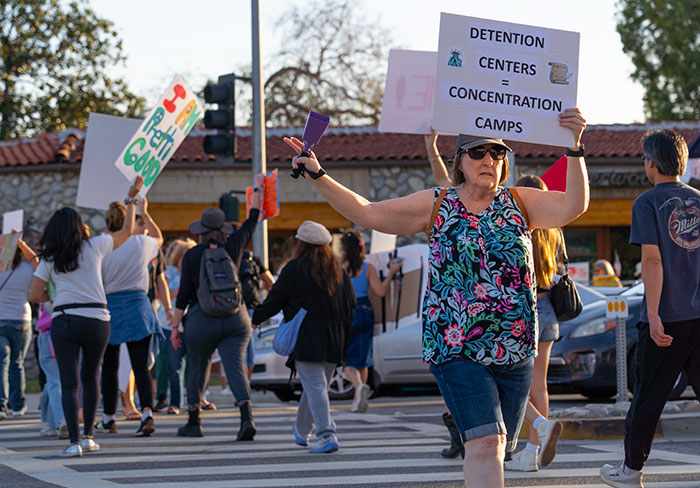Artists, activists ‘Quetzal’ to play Folk Festival
“When Ronald Reagan was shot, I said to my mom, ‘I hope he dies.’” Then a teenager steeped in the Chicano activism of his parents and grandparents, Quetzal Flores thought his youthful bluster would be met with welcome ears. “My mom said, ‘Don’t you ever say that about another human being.’
“It shocked me, but it still set me in my place, and created a precedent for the rest of my life, and that is: humanity is first,” he said. “That’s a human being, no matter how sick he may be, he’s still a human being.”
Mr. Flores, now a Grammy Award-winning musician and songwriter, took that simple but powerful message forward, founding Quetzal in 1993, with his wife Martha Gonzalez joining the band in 1995. Quetzal has fashioned a career based not on a carefully crafted image and corporate sponsorships, but on activist politics, community outreach and expanding the palette of Chicano music in Los Angeles.
The band’s activism is admirable, but it’s hardly singular. What sets Quetzal apart is the level of involvement in its community, and the depth of its collective reach.
Ms. Gonzalez is a Fulbright Fellow, holds a doctorate in gender, women and sexuality studies from the University of Washington and is an assistant professor in the Intercollegiate Chicano/a Latino/a Studies Department at Scripps College in Claremont.
Mr. Flores is program manager at Alliance for California Traditional Arts, where among his duties is the facilitation of the group’s “arts in corrections” pilot program; he helps to run Artivist Entertainment, an independent entertainment company he founded with Maya Jupiter, Aloe Blacc, Alberto Lopez and Veronica Gonzalez, dedicated to representing artists whose art and music inspire positive social change; and he records and produces music from like-minded artists out of his home studio.
The couple lives in Alhambra with their 11-year-old son, Sandino.
Ms. Gonzalez’s parents are immigrants from Guadalajara, Jalisco, Mexico. “Music was always central to the home,” she said. “My dad used to want to be a singer and my brother, sister and I all became singers. My youngest sister is a dancer and has a master’s degree in education. Overall, music is a pastime. We never had much money, so music became that life raft.”
Roberto Flores, Mr. Flores’ father, is a professor at Pasadena City College and is also a Fulbright Fellow. His mother, Consuelo Valdez, is a therapist with Los Angeles-based Homeboy Industries, the largest and most successful gang intervention, rehabilitation and re-entry program in the world.
“If you could have been a fly on the wall in my home growing up,” Mr. Flores said of his childhood spent among California’s Chicano activist community. “It was constant. We were always at marches. There were secret meetings in my home. The phone thing…”
“The phone thing” references the memory of watching his father unscrew the microphone side of the family’s old home telephone, so that he could disengage the tap, “Both of my parents have FBI files. They requested them, and there are lots of black markings [redactions].”
With Mr. Flores’ background, it’s no surprise Quetzal operates more as an artist-driven collective for social and political change rather than a party bus moving from town to town, shedding groupies and making TMZ headlines for its bad behavior.
“There was a larger vision for [Quetzal],” Mr. Flores explained. “It was difficult because everything about that world is telling you to detach yourself from your community, from that root. And it’s very attractive. It’s very seductive. However, if you really sit there and think about things, and think about your peers and contemporaries, and your predecessors as well, and talk to them, you see the reality of the situation.”
Quetzal’s new record, “The Eternal Get Down,” is due out late this summer on Folkways Records. This reporter was allowed a preview of the opening track, “Espejos vs. The Gaze,” and it’s clear listening to Ms. Gonzalez’s lyric that the band has lost none of its righteous anger:
“Take a picture of my suffering
A momento of my wares
Something you’ll be writing home about
Buy a bracelet here or there…
Touch my braid, and lose a finger
Choose a color, don’t you linger
Because your compliments annoy me
Just pay me what you owe me”
The song was inspired by a conversation Ms. Gonzalez overheard in Mexico, when a Mestiza woman attempted to humiliate an indigenous artisan. “The self- proclaimed ‘anthropologist’ harassed the woman trying to get her to admit she did not knit the work she was selling,” explained Ms. Gonzalez. “She tried to get her to say that it was from a different state and that she was an ignorant thief. She then proceeded to try and talk her down on the price of a blouse she liked. I was appalled at the way in which she treated her.
“Later that night I had a dream that the indigenous woman defended herself by yelling at the woman and telling her to get the hell out of her face. The reality I had witnessed was quite another. She was almost scared of her, knowing full well that as an indigenous woman she had second-class citizen rights, and could be criminalized in a second. The scenario I depict is not real, but it is inspired by real events, especially by the Zapatistas and other indigenous groups in Mexico who are beginning to say ‘enough.’”
“Dignity” is an idea raised frequently by both Mr. Flores and Ms. Gonzalez. It’s also heard again and again in doing one’s research on Quetzal.
“It’s an important concept,” Mr. Flores said. “It’s something that has to be maintained and nurtured. Capitalism and neocolonialism, in general, rely on people relinquishing their dignity for commodity. Ruben Blades talks about it in ‘Plastico’ (off Blades’ 1978 album, “Siembra”). It’s about this age of mass marketing, creating these illusions that something is important and necessary.”
Mr. Flores said the band now has a simple way of determining whether a decision makes sense for Quetzal: “The first question we always ask ourselves is ‘Is this dignified? Is this going to compromise our dignity as human beings, or as artists who have devoted a lot of time and effort into building relationships that are founded in dignity, founded in mutual respect, in creating regenerative cycles of love and dignity?’”
The band finds itself in a good spot more than 20 years into their career. They’re now royalty among Los Angeles’ Chicano music community, contemporaries with some of the musicians they molded themselves after. There is one band, though, that Mr. Flores will always be chasing.
“We’re like a rib of Los Lobos. We come from them,” he said of the legendary, genre-busting East Los Angeles band. “Those guys are my champions. We’re music lovers, and we follow a lot of different bands, but Los Lobos is that marker that you look toward.”
And it’s impossible to listen to any of Quetzal’s catalog—especially 2013’s Grammy-winner “Imaginaries” and 2014’s stunning “Quetzanimales”—without being reminded of the breadth and depth of the band’s influences. This wonderful stew is, of course, rooted in history.
“A proper Chicano,” Mr. Flores said, laughing, “will understand that without black music, without punk rock, without Taiko drums, without understanding all of that, there is no Chicano music. Chicano music relies on that. It is a hybrid. It’s hybridizing your embodied experience as a citizen, as a community member, in Los Angeles.”
Mr. Flores cited a passage from Firmly Planted in Ambiguity, a landmark work from one of his and Ms. Gonzalez’ heroes, the late Gloria Anzaldúa, mother of Chicana feminism: “There’s an agreement that, okay, this is how we express ourselves, and this is how we feel comfortable expressing ourselves. And as ambiguous as it may be, that’s our comfortable spot.”
Quetzal appears at the Claremont Folk Music Festival Sunday, May 22 at Pomona College’s Sontag Greek Theatre. Other acts include Tom Morello (from Rage Against the Machine), David Lindley and the Yuval Ron Ensemble. Tickets are $30 and are available at the Folk Music Center in Claremont (220 Yale Ave.), or online at cff16.brownpapertickets.com.
More information on Quetzal can be found at quetzanimales.com.
Mr. Flores is a father, award-winning songwriter and musician, tireless community organizer, cultural worker, accomplished artist and Program Manager for the Alliance for California Traditional Arts.
Ms. Gonzalez is a mother and an award-winning songwriter and musician. She has also received numerous scholarly awards and citations, including a Fulbright Fellowship and a Ford Foundation Dissertation Fellowship. Her website is at marthagonzalez.net.
—Mick Rhodes
mickrhodes@claremont-courier.com








0 Comments